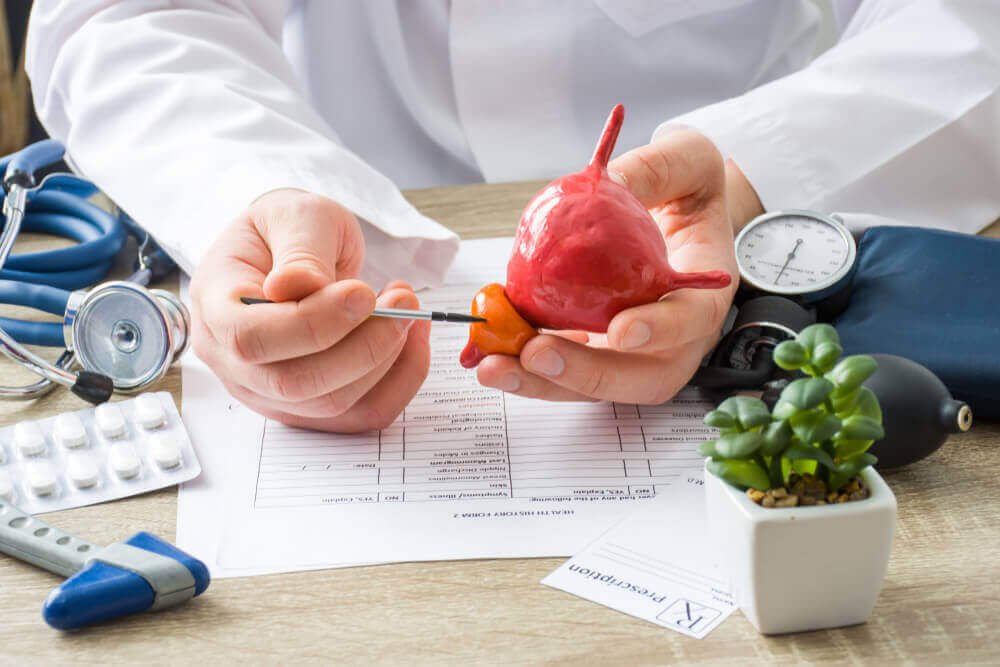An Enlarged Prostate should not be a cause of worry to you. Given that the prostate starts growing naturally from the age of 25, it is a benign condition and does not require treatment unless the symptoms are getting out of hand and causing obstructions in your day to day life. The problem can sometimes occur when you have prostate cancer, however there is no conclusive evidence of the causality. Both the conditions can exist together.
According to an article by Harvard Health, about 50-60% males never develop any harsh symptoms of an enlarged prostate, however for those who eventually do get them, life can become miserable. Symptoms range from a weak interrupted urine stream to urges to urinate, incontinence, frequent urination at night. There is also a sense of incomplete emptying of the bladder that accompanies Benign Prostatic Hyperplasia. Monitoring the changes in symptoms carefully should be enough to deal with BPH, unless the symptoms are troubling. An Enlarged Prostate Urologist in Miami would start by recommending lifestyle changes to manage it. If the complications develop at a further stage, here are some treatment options available for BPH.
- Alpha Blockers
According to healthline magazine, alpha blockers work on the bladder neck muscles and prostate muscle fibers by relaxing them. This relaxation allows urine to flow out without any restriction. Urine flow is back to normal and the urge to urinate frequently is also brought under control.
- 5-alpha reductase inhibitors
The effect of this medication kicks in at least 6 months and they work by decelerating the production of hormones that lead to the growth of the prostate. However, this medication alone sometimes does not produce the desired results. For that it has to be taken in combination with the Alpha blockers.
- Transurethral Needle Ablation (TUNA)
This procedure is minimally invasive. High frequency radio waves are used to burn a region of the prostate in this procedure. This is to produce better urine flow and reduce the troublesome symptoms of BPH.
- Hot Water Treatment
A catheter is used to employ to deliver hot water to specifically heat up a certain tissue area of the prostate which is causing symptoms. This treatment is location specific and neighbouring tissues are not harmed at all.
- Transurethral Surgery
A resectoscope is used to remove prostate tissue obstructing the urethra in this procedure. In another method of transurethral surgery a transurethral incision of the prostate (TUIP). This process widens the urethra to allow free flow of urine from it.
- Laser Surgery
In this surgery a scope is inserted into the penis to remove prostate tissue by melting also known as ablation or cutting it as required. The laser serves to melt the obstruction causing tissue.
- Open simple prostatectomy
This is open surgery and is required in severe cases where the damage has spread to bladder, kidneys etc. This differs from prostatectomy in that prostatectomy is used to remove the prostate gland in case of cancer. Open simple Prostatectomy only the tissue serving to obstruct the flow of urine is removed surgically.
All these procedures require an experienced Enlarged Prostate Urologist in Miami and Gousse Urology with more than quarter of a century experience in providing excellent services related to bladder and kidney health is a premier Urology Institute.
Urologists also offer lifestyle changes that include some self care tips such as:
- Drinking enough fluids and eating good quality fibrous fruits throughout the day
- Pelvic strengthening exercises also known as Kegel exercises
- Reduce the intake of alcohol and caffeine
- Speak to the doctor in case of any abnormal incident
- Decongestants and antihistamines should be avoided if you are encountering problems with the bowel.
- Train the urinary system to empty at certain time intervals only
- Closely monitor how frequently and at what times do you urinate
- Do not wait if there is an urge to urinate-bladder infections occur due to concentrated urine.

